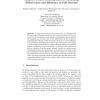Free Online Productivity Tools
i2Speak
i2Symbol
i2OCR
iTex2Img
iWeb2Print
iWeb2Shot
i2Type
iPdf2Split
iPdf2Merge
i2Bopomofo
i2Arabic
i2Style
i2Image
i2PDF
iLatex2Rtf
Sci2ools
114
click to vote
DEXA
2004
Springer
2004
Springer
Adaptive Double Routing Indices: Combining Effectiveness and Efficiency in P2P Systems
Unstructured peer-to-peer systems rely on strategies and data structures (Routing Indices) for the routing of requests in the network. For those requests corresponding to information retrieval queries, the emphasis can be either put on the effectiveness of the routing by privileging the relevance of the documents retrieved, or on the efficiency of the routing by privileging the response time. We propose in this paper a novel routing strategy based on adaptive Routing Indices. The Routing Indices are adaptive to the environment, i.e. network traffic, location, as well as relevance of the documents indexed, thanks to a reinforcement learning approach to their maintenance. The strategy can be used to tune the compromise between efficient and effective routing. It combines the estimation of the response time of routes with the estimation of the relevance of routes to keywords. We study performance and the tuning of the compromise offered by this novel strategy under various characteristics...
Related Content
| Added | 20 Aug 2010 |
| Updated | 20 Aug 2010 |
| Type | Conference |
| Year | 2004 |
| Where | DEXA |
| Authors | Stéphane Bressan, Achmad Nizar Hidayanto, Chu Yee Liau, Zainal A. Hasibuan |
Comments (0)

